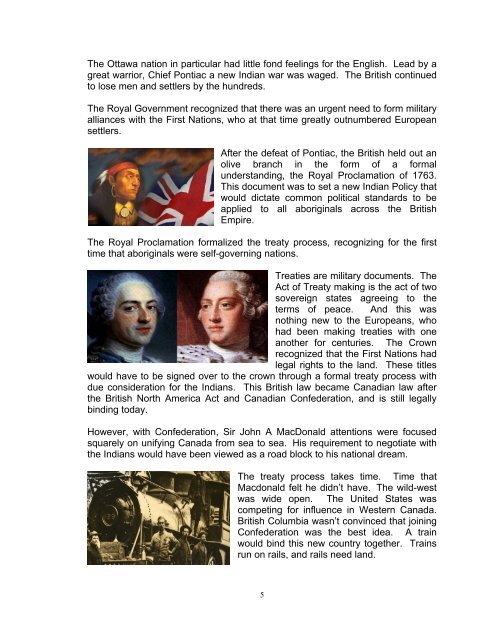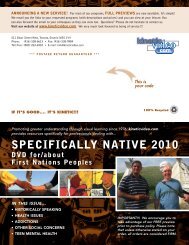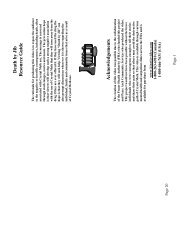The Fallen Feather - Kinetic Video
The Fallen Feather - Kinetic Video
The Fallen Feather - Kinetic Video
You also want an ePaper? Increase the reach of your titles
YUMPU automatically turns print PDFs into web optimized ePapers that Google loves.
<strong>The</strong> Ottawa nation in particular had little fond feelings for the English. Lead by a<br />
great warrior, Chief Pontiac a new Indian war was waged. <strong>The</strong> British continued<br />
to lose men and settlers by the hundreds.<br />
<strong>The</strong> Royal Government recognized that there was an urgent need to form military<br />
alliances with the First Nations, who at that time greatly outnumbered European<br />
settlers.<br />
After the defeat of Pontiac, the British held out an<br />
olive branch in the form of a formal<br />
understanding, the Royal Proclamation of 1763.<br />
This document was to set a new Indian Policy that<br />
would dictate common political standards to be<br />
applied to all aboriginals across the British<br />
Empire.<br />
<strong>The</strong> Royal Proclamation formalized the treaty process, recognizing for the first<br />
time that aboriginals were self-governing nations.<br />
Treaties are military documents. <strong>The</strong><br />
Act of Treaty making is the act of two<br />
sovereign states agreeing to the<br />
terms of peace. And this was<br />
nothing new to the Europeans, who<br />
had been making treaties with one<br />
another for centuries. <strong>The</strong> Crown<br />
recognized that the First Nations had<br />
legal rights to the land. <strong>The</strong>se titles<br />
would have to be signed over to the crown through a formal treaty process with<br />
due consideration for the Indians. This British law became Canadian law after<br />
the British North America Act and Canadian Confederation, and is still legally<br />
binding today.<br />
However, with Confederation, Sir John A MacDonald attentions were focused<br />
squarely on unifying Canada from sea to sea. His requirement to negotiate with<br />
the Indians would have been viewed as a road block to his national dream.<br />
<strong>The</strong> treaty process takes time. Time that<br />
Macdonald felt he didn’t have. <strong>The</strong> wild-west<br />
was wide open. <strong>The</strong> United States was<br />
competing for influence in Western Canada.<br />
British Columbia wasn’t convinced that joining<br />
Confederation was the best idea. A train<br />
would bind this new country together. Trains<br />
run on rails, and rails need land.<br />
5
















